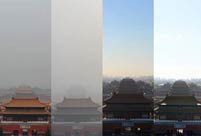BEIJING, Nov. 11 -- China's family planning policy has helped ease constraints on resources and environmental pressure, Mao Qun'an, National Health and Family Planning Commission spokesman, told a press conference Monday.
He said the policy had contained the rapidly swelling population. The country's birth rate dwindled from 33.4 to 12.1 per thousand from 1970 to 2012.
Last year, the population of new borns stood at 16.35 million, with an increase of 6.69 million from 2011, according to Mao.
Without the policy, Mao estimated, China today might have to support a population of 1.7 to 1.8 billion, and per capita ownership of resources, including arable land, grain, forests, drinking water and energy, would be 20 percent less than what it is today.
If that was case, resource and environment capacity would not be able to support rapid economic development, Mao said.
In the late 1970s, China introduced its family planning policy to rein in population growth by limiting most urban couples to one child and most rural couples to two children, if the first was a girl.
The policy was later relaxed, with the current rule stipulating that to have a second child, both parents must be only children.
 Luxury-cars parade held in Dubai
Luxury-cars parade held in Dubai Special forces take tough training sessions
Special forces take tough training sessions Fire guts 22-storey Nigeria commercial building in Lagos
Fire guts 22-storey Nigeria commercial building in Lagos A girl takes care of paralyzed father for 10 years
A girl takes care of paralyzed father for 10 years A record of Beijing air quality change
A record of Beijing air quality change In pictures: explosions occur in Taiyuan
In pictures: explosions occur in Taiyuan Hello! Horror Halloween Celebration!
Hello! Horror Halloween Celebration!  The catwalk to the world of fashion
The catwalk to the world of fashion  Cruise trip to Taiwan
Cruise trip to Taiwan  Maritime counter-terrorism drill
Maritime counter-terrorism drill Loyal dog waits for master for six months
Loyal dog waits for master for six months Oriental education or western education?
Oriental education or western education? China in autumn: Kingdom of red and golden
China in autumn: Kingdom of red and golden National Geographic Traveler Photo Contest
National Geographic Traveler Photo Contest Chinese screen goddesses from Beijing Film Academy
Chinese screen goddesses from Beijing Film Academy Day|Week|Month